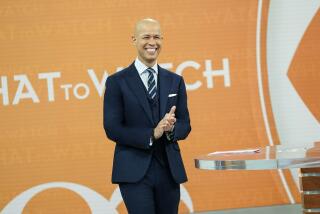Seeing the light of ‘Day’
- Share via
It’s a tense moment in National Public Radio’s Culver City studios as the staff of “Day to Day” attempts to work through the endless challenges of producing a major new show.
NPR veteran J.J. Sutherland is guiding his crew through the details of completing one of the final dry runs for the first weekday news magazine NPR has launched since “Morning Edition” was created 24 years ago. Adding to the importance of the show is that “Day to Day” is one of the few programs to originate from NPR’s year-old West Coast production facility.
“Morning Edition” and the even more venerable afternoon drive-time staple “All Things Considered” serve as the signature shows on NPR’s daily schedule and are major forces in the world of radio. The audiences for those two shows -- a daily average of 12.7 million listeners for “Morning Edition,” 11 million for “All Things Considered” -- rank second and third, respectively, behind only Rush Limbaugh among all radio shows, whether supported by ads or listeners. As popular as they are, though, they leave a gap in the middle of the day.
“It’s a program that’s long overdue,” said Bill Davis, president of Southern California Public Radio, which operates KPCC-FM (89.3). He said NPR was discussing such a midday show back in 2000, when he was senior vice president for programming at the network.
“The original assumption was that NPR listeners were too busy in the middle of the day at work to listen to NPR,” Davis said. It turned out, though, that the audience was listening to the radio but tuning in to music or AM talk stations. So network executives cooked up “Day to Day.”
“It’s something we want to support,” said Ruth Seymour, general manager of KCRW-FM (89.9), which will carry the hourlong show starting at noon Monday. “We like the fact that the West Coast studios are doing an ambitious newsmagazine. It does have a West Coast sensibility, and they have a desire to reach a younger audience.”
The show will let its listeners get their hard news from its morning and afternoon counterparts -- unless a momentous story breaks during the broadcast -- and focus more on NPR-style features, looking at events of the day from different angles. When Prime Minister Tony Blair spoke to Congress, “Day to Day” looked at his sense of right and wrong and the part it played in Britain’s decision to fight Iraq. In another segment, host Alex Chadwick talked to a cook about the hidden ingredients restaurants add to meals, such as supposedly healthy fish slathered in butter and oil. The key themes the show’s producers say they want to mine are “ideas, beliefs and behaviors.”
The staff has produced about 20 pilot programs, complete with interviews, music, news breaks and all the other features of the show, all to work out the kinks before they go live. But they’re not striving for rigid perfection.
“ ‘Morning Edition’ and ‘All Things Considered’ are very finely crafted and produced and edited,” said Chadwick, a 26-year NPR veteran. “We want this program to feel a little looser. We want it to feel a little more spontaneous.”
The show will include segments that are shorter than the long features on “Morning Edition” and “All Things Considered,” for listeners who don’t have the time midday to sit in their cars, waiting for the end of a story. And it’s a program whose producers hope will take some chances. One example is having Friday film reviews by Marshall Heyman from the online magazine Slate, whose not-your-typical-radio-voice one “Day to Day” staffer described as “addictively weird.”
Slate is teaming with NPR to produce the show, a collaboration that the network says is its first with a commercial media outlet in its 33-year history. Slate commentators have appeared on NPR since the Internet magazine debuted seven years ago, and the magazine has long been interested in branching out to radio, publisher Cyrus Krohn said.
“We’re just trying to have fun and take risks, smart risks, and be a little edgier in the way we present ourselves,” he said.
Sutherland said NPR’s senior vice president for programming, Jay Kernis, first spoke to him about the program three years ago. He finally started interviewing for his staff on Sept. 10, 2001. But he soon was reassigned to work on coverage of terrorism, and then Afghanistan. Then the sour economy deterred NPR from launching its new endeavor. By the end of 2002, the show was definitely on, and Sutherland began assembling a staff, until “everything got held up for another war.” For about the past month, though, they’ve been able to steamroll toward their Monday launch date.
Sutherland said he always wanted Chadwick to be the host, citing his familiarity to NPR listeners, from his stints as a reporter and host on “Morning Edition,” “Weekend Edition” and “All Things Considered,” his versatility in reporting and interviewing stories from hard news to light features, and his writing ability.
But Kernis, who has known Chadwick for 25 years and worked with him on the committee creating “Morning Edition,” said the new assignment was a tough sell. Chadwick says he already “had the kind of job where people write in and say, ‘How can I get your job?’ ”
He was a reporter for “Morning Edition” and a correspondent for its National Geographic “Radio Expeditions” features. They offered him the “Day to Day” hosting job in December as he was heading to the Sahara desert for several weeks, where he was going to follow a camel caravan of salt traders from Timbuktu. But the job offer “was a huge complication in my life.”
His wife, Carolyn Jensen, is the creator and executive producer of “Radio Expeditions.”
“She was with me on that trip in the Sahara,” Chadwick said. “There were some very cold nights and some long, long drives.”
But both had toyed with moving to California someday -- her family lives in the state, and he enjoyed his time in San Francisco, working as a writer for KRON television. So now she oversees the “Radio Expeditions” features from an office down the hall from Chadwick’s, in the unassuming building that serves as NPR’s West Coast facility.
“I like Washington. I could have happily stayed there forever,” he said, and had for 30 years. But “there’s something enormously alluring about Los Angeles. It seems to me a place of energy, of optimism, of excitement.
“People are conversational here in a way that they’re not back East. I’m noticing the absence of some kind of social barrier,” he said. “We want a program coming out of NPR that’s not produced out of Washington.”
And attaching Chadwick to the program convinced not only potential staffers to sign up, but allayed doubts at some stations about the show.
“I was always sure it was going to work when I heard Alex was going to do it,” Seymour said. “A lot depends on the charisma and personality of the host. Alex is a good radio companion.”
KCRW plans to air the program at noon, pushing “The World” to 3 p.m. and pulling “Fresh Air” with Terry Gross off the schedule. (“Fresh Air” will continue to air on KPCC.) “Studio 360,” which had aired Fridays at 3 p.m., moves to Sundays at 11 a.m. KPCC also plans to join the show’s debut, but the air time was still not set as of Thursday morning. So far, nearly 50 of NPR’s 730 member stations have agreed to carry the program.
During one of the pilot shows, Chadwick talked with Sal Masekela, extreme-sports commentator for ESPN, about the Lakers. It’s not only a segment for “Day to Day,” but a job interview, as the show is looking for a regular guest analyst to discuss sports. Masekela, the dreadlocked son of trumpeter Hugh Masekela, is the seventh candidate they’ve tried, and has an easy rapport with Chadwick.
And he’s not just a fresh voice of the kind that network executives hope NPR West and “Day to Day” will bring to the rest of the system. He’s also a young aficionado of NPR, a constituency that the network is hoping to nurture.
“When they called me to come into NPR, I said, ‘Are you kidding me?’ NPR is the coolest thing on the radio,” Masekela said. “Everything else is so packaged. It’s insightful, intelligent radio.”
Slate hopes its involvement also draws some of its younger, hipper audience to NPR while exposing more of NPR’s core listeners to the online magazine, Krohn said.
Meanwhile, after one of his numerous smoke breaks, Sutherland returns to his office a few feet away and says he’s “psyched” about the readiness of his crew after seven straight days of pilot programs, in spite of the glitches from that morning.
“That’s radio -- the fear, the panic, and then the incredible success of putting together this chess game,” he said. “There’s nothing like that rush. That’s why I do it.”
More to Read
The biggest entertainment stories
Get our big stories about Hollywood, film, television, music, arts, culture and more right in your inbox as soon as they publish.
You may occasionally receive promotional content from the Los Angeles Times.










